New exploration opportunities in the offshore Houtman and Abrolhos sub-basins, northern Perth Basin, WA
Nadege Rollet A , Chris Nicholson A , Andrew Jones A , Emmanuelle Grosjean A , George Bernardel A and John Kennard AGeoscience Australia
The APPEA Journal 53(1) 97-114 https://doi.org/10.1071/AJ12008
Published: 2013
Abstract
The 2013 Acreage Release Areas W13-19 and W13-20 in the offshore northern Perth Basin, Western Australia, cover more than 19,000 km2 in parts of the Houtman, Abrolhos, Zeewyck and Gascoyne sub-basins. The Release Areas are located adjacent to WA-481-P, the only active offshore exploration permit in the Perth Basin, granted to joint venture partners Murphy Australia Oil Pty Ltd, Kufpec Australia Pty Ltd and Samsung Oil and Gas Australia Pty Ltd in August 2012. Geoscience Australia recently undertook a regional prospectivity study in the area as part of the Australian Government’s Offshore Energy Security Program, which provides fresh insights into basin evolution and hydrocarbon prospectivity.
A sequence stratigraphic framework, based on new biostratigraphic sampling and interpretation, and an updated tectonostratigraphic model, using multiple 1D burial history models for Permian to Cenozoic sequences, have been developed. New geochemical studies of key offshore wells demonstrate that the oil-prone source interval of the Lopingian–Lower Triassic Hovea Member extends regionally offshore into the Abrolhos Sub-basin and potentially as far as the Houtman Sub-basin. This is supported by fluid inclusion data that provide evidence for palaeo-oil columns within Permian reservoirs in wells from the Abrolhos Sub-basin. Oil trapped in fluid inclusions in Houtman-1 can be linked to Jurassic source rocks, suggesting that multiple petroleum systems are effective in the Release Areas. The presence of active petroleum systems is also supported by the results of a recent marine survey. Potential seepage sites on the seafloor over reactivated faults correlate with hydroacoustic flares, pockmarks and dark colored viscous fluids that were observed over the areas. This may indicate an active modern-day petroleum system in the Houtman Sub-basin. Finally, a trap integrity analysis was undertaken to mitigate exploration risks associated with trap failure during Early Cretaceous breakup and provides a predictive approach to prospect assessment.
These results provide strong support for the presence of active petroleum systems in the offshore northern Perth Basin and upgrade the prospectivity of the Release Areas.
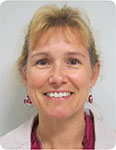
Nadege Rollet is a research scientist in Geoscience Australia’s Basin Resources Group. Nadege graduated from the University of Paris—Pierre et Marie Curie, France, where she obtained a MSc (1995) and a PhD (1999) in geology and geophysics. Her studies focused on geodynamic reconstructions around the South Tasman Rise, and the structural framework of the Ligurian Sea in the Western Mediterranean. Since joining Geoscience Australia in 2000, Nadege has contributed to geodynamic reconstructions, structural framework and seepage studies for Australia’s continental margins, and assessments of the petroleum prospectivity in the Remote Eastern Frontiers and offshore northern Perth Basin. Nadege is presently working on a project investigating CO2 storage and petroleum prospectivity in the Browse Basin. Member: PESA. Nadege.Rollet@ga.gov.au |

Chris Nicholson is a geoscientist in Geoscience Australia's Basin Resources Group. He graduated from ANU with a BSc (Hons) (2000). His research has focused the hydrocarbon prospectivity of frontier basins on Australia's continental margin. Recently, he worked with a multi-disciplinary team to re-assess the hydrocarbon prospectivity of the offshore northern Perth Basin. Previously, he undertook similar research on the Mentelle, Vlaming, and Bremer basins. He is leading a regional integrated assessment of petroleum prospectivity and CO2 storage potential in the Browse Basin. Member: PESA and EAGE. Chris.Nicholson@ga.gov.au |
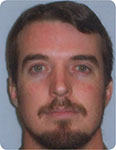
Andrew Jones completed a BSc (honours) (Earth sciences) (1997) and a PhD (sedimentology) (2003) at UQ. He joined Geoscience Australia in 2001 where he joined a multidisciplinary team studying natural hydrocarbon seepage. He then went on to specialise in regional basin analyses as a senior geologist within the petroleum prospectivity group. In 2012, he led a team assessing the potential impacts of natural hazard risks on developing countries in Asia Pacific. Andrew.Jones@ga.gov.au |
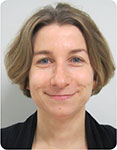
Emmanuelle Grosjean joined Geoscience Australia as an organic geochemist in 2005 and has since been involved in numerous studies about the petroleum prospectivity of Australia's offshore basins. She received a PhD (organic chemistry) from the University Louis Pasteur of Strasbourg, France, in 2002 and subsequently spent three post-doctoral years at MIT working on the Infracambrian petroleum systems of Oman. Emmanuelle.Grosjean@ga.gov.au |
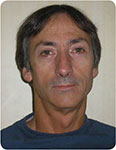
George Bernardel is a geoscientist in Geoscience Australiaâs Basin Resources Group. He has a BSc (Hons) and BEng. He has worked at Geoscience Australia since 1988 after a short period at Bridge Oil NL. In the past few years, he has been researching about the architecture and evolution of Australiaâs Southwest Margin. Member: PESA and EAGE. George.Bernardel@ga.gov.au |
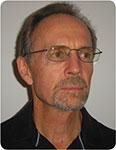
John Kennard obtained a BSc (honours) (geology) from ANU (1974) and a PhD (geology) from Memorial University of Newfoundland, Canada (1989). He has more than 35 years of experience, formerly with Geoscience Australia, in geological mapping, sedimentary basin analysis, petroleum geology, and natural hydrocarbon seepage studies, including sequence stratigraphic and petroleum systems analysis of Australia's North West Shelf (Bonaparte and Browse Basins) and the offshore Perth, Canning, and Amadeus basins. John.Kennard@ga.gov.au |


